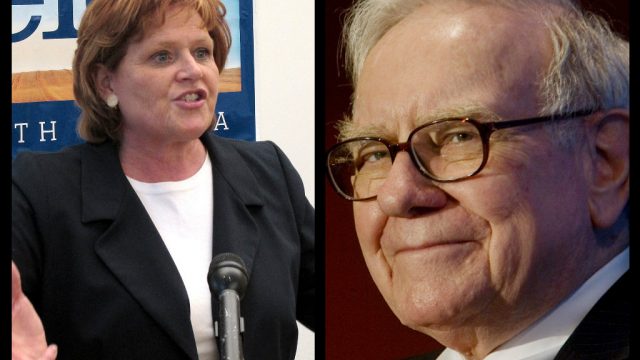The War Over Pipelines: Heidi Heitkamp Has Big Financial Ties To Warren Buffett

After a catastrophic, but thankfully not deadly or injurious, train derailment near Casselton, North Dakota, right before the holiday the need for pipeline infrastructure has been put into sharp focus. Pipelines are, without a doubt, a safer way to transport oil. They’re not perfect – as North Dakotans saw earlier this year when a Tesoro-owned pipeline dumped about 20,000 barrels of oil on the ground near Tioga – but one thing pipelines never do is derail.
All railroads run through population centers (western society was built around the railroad), whereas pipelines tend to avoid population areas. And while oil leaking isn’t good for the environment, a leak is far less deadly than a train coming off the rails.
But the build-out of pipeline infrastructure has been hampered by politics. The Keystone XL pipeline project, which could take roughly 10% of the Bakken’s current output, has been on ice for years as the Obama administration has dithered at the behest of noisy left-wing anti-fossil fuel activists. The Sandpiper project, which could take as much as 25% of the Bakken’s current output and will soon be getting public hearings here in North Dakota, has faced heavy opposition from activists in Minnesota.
The obstruction of pipeline projects has been a boon for the rail industry. According to the Association of American Railroads crude oil rail shipments increased 42% from the 3rd quarter of 2012 through the 3rd quarter of 2013. In North Dakota, specifically, oil-by-rail capacity has increased a whopping 2,873% since 2008:

A big beneficiary of this ramp-up in demand for rail services is Burlington Northern Santa Fe Railroad, owned by outspoken Obama supporter Warren Buffett (it was BNSF trains that derailed near Casselton). Buffett bought up BNSF in 2009, shortly after President Obama was elected, and it is widely speculated that the President’s opposition to the Keystone XL project is a very profitable favor to Buffett.
But is North Dakota Senator Heidi Heitkamp also making good on that favor?
Heitkamp campaigned on the Keystone project, promising voters that she would “stand up” to President Obama on the issue. But since taking office, Heitkamp has been anything but a leader on the issue. Earlier this year when President Obama ridiculed the economic impact of the Keystone project, prompting a fierce response from North Dakota Senator John Hoeven, Heitkamp was largely silent. She spends little time talking about the issue these days.
She does about the minimum required to maintain her status as a Keystone supporter, but little more.
Why was Heitkamp so outspoken about Keystone during her campaign, but so softspoken on the issue now that she’s in office?
Maybe this has something to do with it: Warren Buffett himself maxed out contributions to both Heitkamp’s pre-primary and general election campaigns:


Also, according to Senate financial disclosures, Heitkamp owns between $166,004 to $415,000 worth of stock in Buffett’s company Berkshire Hataway (Senate disclosures are weird, reporting ranges for values of assets instead of specific dollar amounts). And Berkshire Hathaway employees were among Heitkamp’s top-ten sources of political contributions in the 2012 cycle, according to OpenSecrets.org.
When it comes to the fight over pipelines, is Heidi Heitkamp more loyal to the promises she made to her constituents, or the financial interests of billionaire Democrat money man?
Maybe that’s something the Senator needs to explain.
Neither of North Dakota’s other two members of Congress – Rep. Kevin Cramer and Sen. John Hoeven – received any personal contributions from Buffett, nor do they own any interest in Buffett’s company. Senator Hoeven did, during his 2010 race, get $18,000 in contributions from Berkshire Hathaway employees, though that appears to be the only connection between Hoeven and Buffett.




